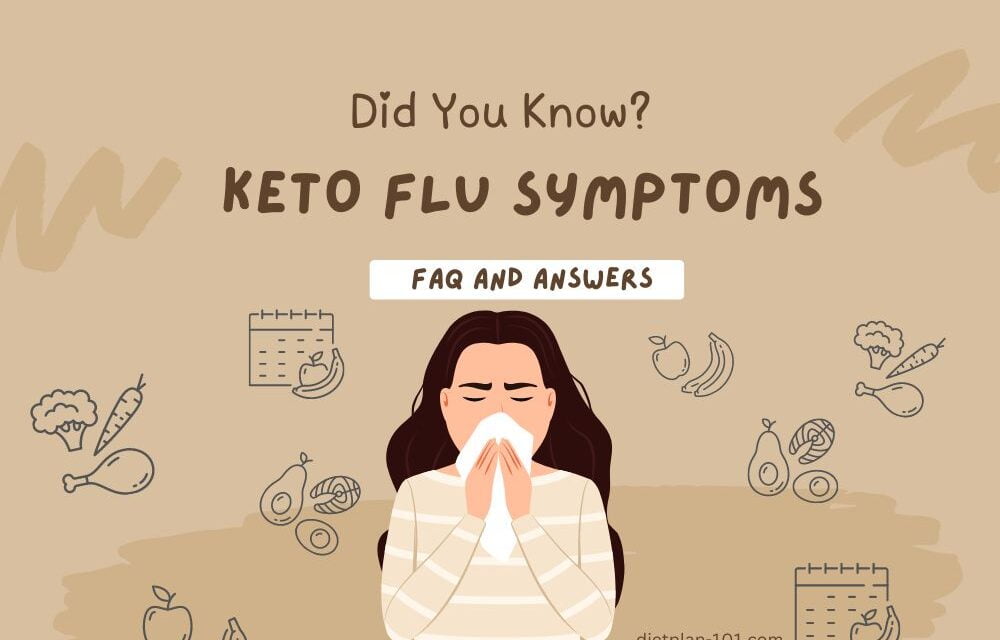Feeling like a zombie caused by keto flu symptoms after starting the ketogenic diet? Don’t worry, you’re not alone! Keto flu is a common temporary side effect that can make you feel like you’ve been hit by a truck. It’s like your body is throwing a tantrum because you’ve taken away its precious carbs.
Keto flu can strike anyone who starts the keto diet or switches over to it, but it’s especially common in newbies who haven’t yet adapted to the changes in their bodies. It’s also known by some creative names like “low-carb flu” or “keto side effects.”
This pesky flu can cause a range of symptoms, from headaches and fatigue to nausea and irritability. It’s like a roller coaster ride you never asked for. We’ll help you by answering some of the most frequently asked questions about keto flu symptoms, understanding what it is, how to prevent it, and what to do if you experience it.

Keto Flu Symptoms: FAQ and Answers
-
What is keto flu?
Answer: Keto flu is a set of temporary symptoms that can occur when you start the ketogenic diet. It’s like your body is going through withdrawal from carbs, and it’s not happy about it. Symptoms may appear two to seven days after starting a ketogenic diet.
-
What are the common symptoms of keto flu?
Answer: Symptoms of keto flu may include fatigue, headache, irritability, difficulty focusing (“brain fog”), lack of motivation, dizziness, sugar cravings, and muscle cramps.
-
How long does keto flu last?
Answer: Keto flu may last up to 4 weeks. Generally, keto flu symptoms tend to resolve within the first week or two.
-
What causes keto flu?
Answer: The main theories behind what causes the keto flu include relative hypoglycemia, carbohydrate withdrawal, hormone imbalance, electrolyte imbalance, and dehydration.
-
How can I prevent keto flu?
Answer: To prevent keto flu, it is important to ensure that you are eating enough healthy fats, drinking enough water, and getting enough electrolytes. Additionally, it is essential to ease into the diet rather than jumping into it full force.
-
Is keto flu dangerous?
Answer: The keto flu is a temporary side effect experienced by those who transition to the ketogenic diet. While it is not dangerous, many people find that it can be unpleasant and uncomfortable while they are experiencing its effects.
-
What are the signs of keto flu?
Answer: Signs of keto flu may include fatigue, headache, irritability, difficulty focusing (“brain fog”), lack of motivation, dizziness, sugar cravings, and muscle cramps.
-
How can I get rid of keto flu?
Answer: To get rid of keto flu, it is important to ensure that you are eating enough healthy fats, drinking enough water, and getting enough electrolytes. It is important to adopt a balanced approach when beginning a new eating plan.
-
Is keto flu a real thing?
Answer: Yes, some symptoms may develop two to seven days after starting a ketogenic diet.
-
What can I do to reduce keto flu symptoms?
Answer: First and foremost, stay hydrated! Those headaches, fatigue, and nausea could just be a result of not drinking enough water. So keep a reusable bottle nearby and sip on that H2O whenever you feel thirsty. And don’t forget to replenish those lost electrolytes with sports drinks or electrolyte mixes.
-
Is keto flu common?
Answer: Keto flu is not uncommon, however, some people may transition to a ketogenic diet without any side effects.
-
How can I minimize keto flu symptoms?
Answer: In addition to hydration and electrolytes, make sure you’re consuming enough fat and carbohydrates to keep your body fueled and satisfied. And don’t forget about fiber, which can help keep things moving smoothly in the digestive department. Lastly, get enough rest and make sure you’re getting enough B vitamins to support your energy levels.
-
Is keto flu the same as the flu?
Answer: No, keto flu is not the same as the flu. Keto flu is a group of symptoms that may appear two to seven days after starting a ketogenic diet. Symptoms may include headache, foggy brain, fatigue, irritability, nausea, difficulty sleeping, and constipation.
-
What are the most common keto flu symptoms?
Answer: The most common keto flu symptoms are fatigue, headache, irritability, and difficulty focusing (“brain fog”).
-
How long does it take for keto flu to go away?
Answer: Keto flu may last up to 4 weeks, but symptoms generally begin to subside after the first week.
-
Can keto flu be prevented?
Answer: Yes, keto flu can be prevented by ensuring that you are eating enough healthy fats, drinking enough water, and getting enough electrolytes. It is important to start slowly into the diet rather than jumping in with both feet.
-
What should I eat to avoid keto flu?
Answer: It is important to eat enough healthy fats, such as avocados, nuts, and olive oil. Additionally, drink enough water and consume electrolytes, such as sodium, potassium, and magnesium.
-
Can I exercise while experiencing keto flu symptoms?
Answer: It is generally safe to exercise while experiencing keto flu symptoms, but it is important to listen to your body and not overdo it. Additionally, it is important to ensure that you are eating enough healthy fats, drinking enough water, and getting enough electrolytes to support your body during exercise.
-
Why do some people experience hot flashes during keto flu?
Answer: Hot flashes can be a symptom of the hormonal changes that occur during the transition to ketosis. As the body adjusts to burning fat for fuel instead of carbs, it can cause fluctuations in hormones like estrogen and testosterone, which can trigger hot flashes.
-
Are there any supplements that can help alleviate keto flu symptoms?
Supplements should be used in addition to eating well, rather than as a replacement for it. While some people may benefit from taking supplements, they should be used under the guidance of a healthcare provider and are not intended to replace food. The following supplements may help prevent or treat keto flu:
Electrolytes are minerals such as sodium, potassium, and magnesium, which are essential for proper bodily function. When following a ketogenic diet, it’s common to lose electrolytes due to increased urination and sweating. Supplementing with electrolytes can help replenish these minerals and alleviate symptoms such as muscle cramps and fatigue.
MCT oil is made up of medium-chain triglycerides and is processed quickly by the body. Studies suggest it can help increase ketone levels, which might improve cognitive function in those with brain fog or fatigue.
Omega-3 fatty acids are essential fats that have been shown to reduce inflammation, a common cause of many keto-flu symptoms.
B-complex vitamins are a group of vitamins that are essential for energy production and proper nervous system function. Supplementing with a B-complex vitamin may help alleviate symptoms such as fatigue and brain fog.
-
Can keto flu occur after being on the ketogenic diet for a while?
While keto flu is typically experienced by people during the first few days on a low-carbohydrate diet, it can also happen after several weeks or months of eating this way because electrolytes may be disrupted even when there isn’t weight loss.

The Bottom Line
Keto flu can be a tough experience, don’t let it get in the way of reaching your health goals. By understanding what this condition is and how it affects people who are on low-carb diets like Keto or Atkins, you will be able to minimize its impact—allowing yourself to stay on track with your better life!
Remember, if any symptoms don’t go away within a few weeks or you notice new ones that never happened before, consult your doctor.





